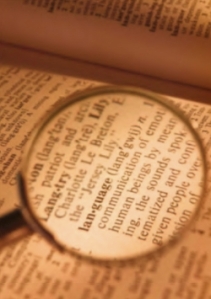Wordplay is a regular column by editor and language writer James Harbeck in which he tastes and plays with English words and usages.
What’s English for Schadenfreude? Schadenfreude, of course.
Words are like Barbie dolls or trading cards or Hummel figurines or camera lenses or kitchen gadgets: if we see one that fills a spot that we don’t already have filled, we want it. Even if we didn’t know that we needed to fill that spot until we saw the word.
This is surely one reason listicles about “untranslatable words” are currently popular. Perhaps you never thought before about wanting a word that means “the look on a person’s face as they watch the person ahead of them at a bakery take the last one of the pastry they wanted,” but once you see a word for it, gosh darn-it, you have to have it.*
The funny thing about those articles on untranslatable words, is that they always give translations for the words. And not just “Schadenfreude (n.): Schadenfreude,” either, but “Enjoyment of someone else’s suffering.” So, really, the words aren’t untranslatable, are they? Not any more than anything else is. There just isn’t a single word for them.
Actually, if you want a really untranslatable word, try a preposition. How about French à? Does that mean “to”? Hmm. In C’est à moi? In J’habite à Montréal? In poulet à la crème? You can’t come up with a single equivalent word for any preposition, because different languages always use them in different ways. And yet within the sentence you can always translate them, as much as you can translate anything else.
But the dirty secret of translation is that you can’t really translate anything else either.
You can only come sufficiently close in the context of the text and your culture. And sometimes barely even sufficiently. Every word has different overtones and associations and references for different cultures – and for different sets of people (and even for each different individual) within a culture. It has different phrases that it typically shows up with, different places it’s been heard, different rhymes, different sets of things it has been commonly used to refer to. And there are different attitudes towards what it refers to.
The idea of a purely accurate translation is like the idea of a truly authentic culinary experience from another culture. Say you want an authentic Thai curry. You go to a Thai restaurant. But they’re using Canadian-grown ingredients. So you go where they have imported Thai ingredients. But you’re still in a Canadian restaurant. So you go to Thailand. Ah. But you’re still…a Canadian in Thailand. You didn’t grow up eating Thai food. Look, imagine a person from another country (maybe Namibia or Vanuatu) eating fruitcake or roast turkey or tuna casserole for the first time. There is no way their experience of it is going to be like yours. You just have to accept that. Cultural experiences are not truly fully translatable. And language is a cultural experience.
Of course, there are many things that are purely functional, and the cultural accretions are quite incidental. “Push to open.” “Tear here.” No problem there; cultural attitudes towards pushing and tearing can be treated as separate issues, which lull us into thinking that accurate translation is possible.
Even there, we’re taking tone and connotation for granted. Why doesn’t the packet say “Rip here”? Why doesn’t the door say “Shove to open”? And once we get even a little farther from the purely mechanical, judgment calls are a regular thing. Send the same document, even on a technical subject, to two different translators and you will get two different renditions, each with its merits and detractions. And if you get into fiction or plays or—the worst—poetry, you’re really just getting a sort of harmonic resonance of the original, on a different instrument.
Consider this:
Nel mezzo del cammin di nostra vita
mi ritrovai per una selva oscura
ché la diritta via era smarrita.
The famous first stanza of Dante’s Divina Commedia. Lovely, flavourful Italian.
Here’s Robert Pinsky’s version:
Midway on our life’s journey, I found myself
In dark woods, the right road lost.
Here’s Henry Wadsworth Longfellow’s:
Midway upon the journey of our life
I found myself within a forest dark,
For the straightforward pathway had been lost.
Here’s Courtney Langdon’s:
When half way through the journey of our life
I found that I was in a gloomy wood,
because the path which led aright was lost.
Right road? Straightforward pathway? Path which led aright? Wood, woods, forest? Dark, gloomy? Midway, half way?
This is why Italians say traduttore traditore. Which has been translated “to translate is to betray.” But really I think it’s better rendered as “Translator? Traitor.”
*Oh, you want a word for that? How about discrescent? Or pain-déçu? I know: bedrøvet. That’s the Danish version of “sad.”
James Harbeck is a web editor, print designer, and trained linguist. Read his blog at sesquiotic.wordpress.com and articles at TheWeek.com.
This article was copy edited by Afara Kimkeran.
